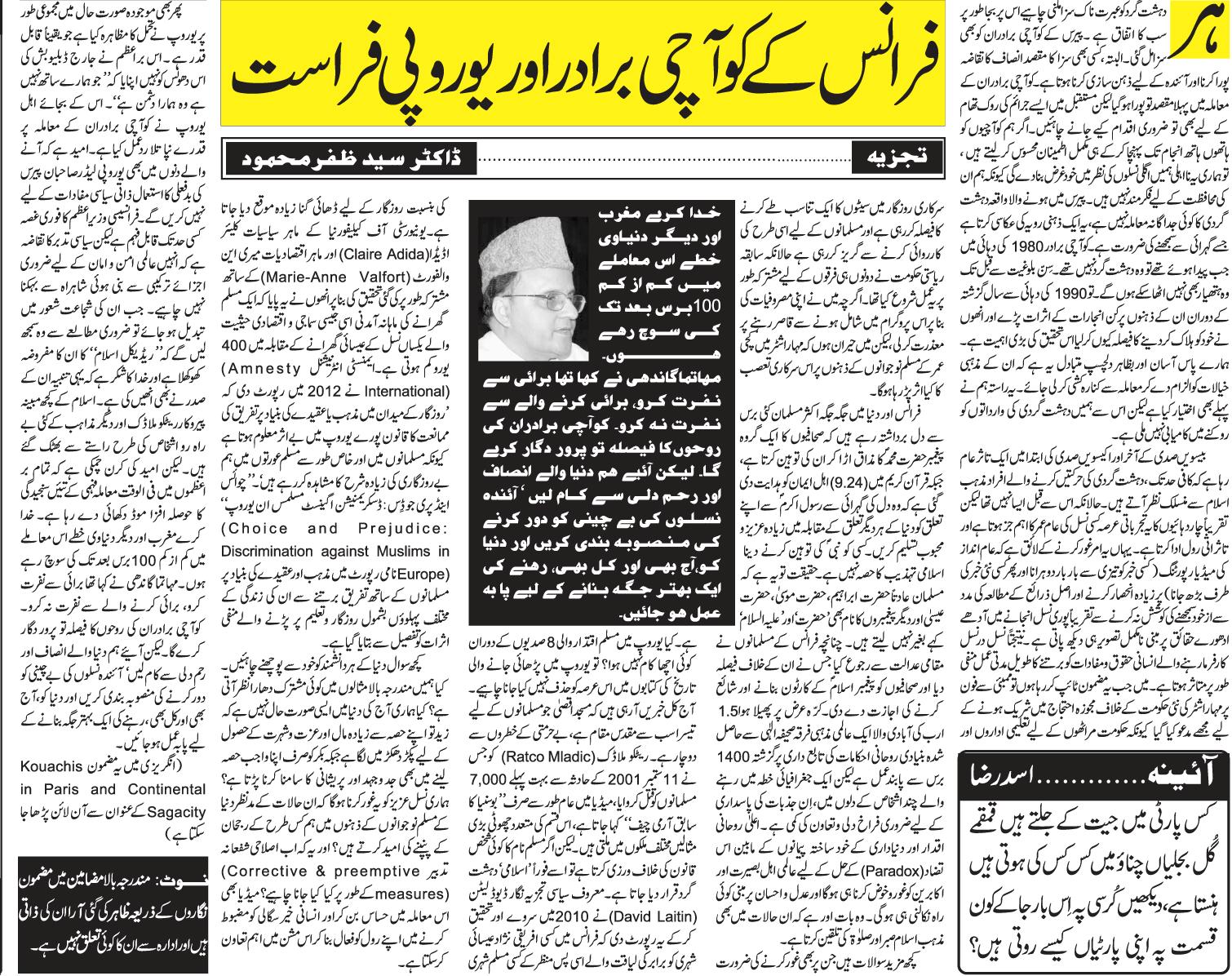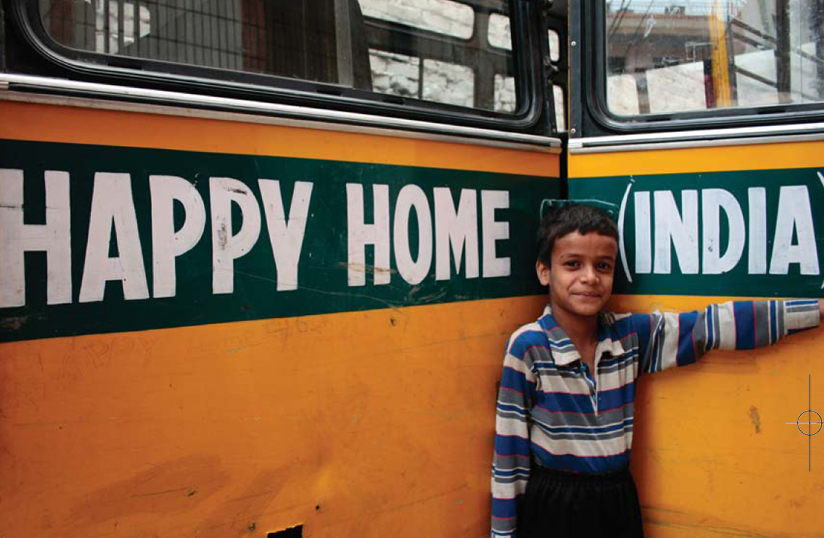click image to enlarge

click to enlarge
Dr Syed Zafar Mahmood, President, ZakatIndia
There is general consensus in the world, and rightly so, that every
terrorist must be given exemplary punishment. Kouachis too have met with
their deserved fate. However, the well considered purposes of any
punishment include retribution, incapacitation and deterrence. In the
case of Kouachis, the first two have been more than fulfilled but what
about deterring their kind of persons from committing similar crimes in
future. Keeping that in mind if we simply feel content to have quickly
caught and brought Kouachis to 'justice' we would be lamented by the
posterity as short sighted and selfish - not adequately concerned with
the welfare of the upcoming generations. What happened in Paris was not
an isolated act of terrorism; it manifested a mindset we need to go deep
into.
When they were born in early 1980s Kouachis were not terrorists. Till
they remained minor also they wouldn't have taken up arms. So, during
15-20 years between late 1990s and 2014 what all went in their mind that
should not have transpired? It would be prudent to coolly research as to
why did they decide even to die. The easier and apparently attractive
option is to blame their religious dogmas and be done with it. We've
taken that softer course earlier but failed to curb the recurrence of
the fits of madness.
In the world of late twentieth and early twenty first centuries there is
a general impression that quite a bit of the terrorism is committed by
those who seem to profess Islam. This period of about four decades is
surely substantial portion of the normal age of a generation. Therefore,
depending mostly on the common reporting style of the media (quickly
repeated mention of a news item and moving on fast to concentrate on the
next item) and not indulging in self-study from original sources, a
generation remains unknowingly confined to incomplete picture based on
half-baked facts. Thus, the process of addressing long term
cross-generational human interest suffers.
While penning this piece I got a phone call from Mumbai inviting me to a
protest meet against the new Maharashtra government moving towards
earmarking for Marathas a percentage of seats in educational
institutions and public services and leaving aside similar action for
Muslims while both had been jointly initiated by the preceding state
government. Though I apologized for my inability to attend as I am
preoccupied, I am still wondering as to what would be currently going
on, by way of general perception, in the minds of Maharashtra Muslim
teenagers.
Most of the Muslims in France and elsewhere in the world have been
aggrieved for many years that a group of journalists had been
deliberately making fun of the Muslim prophet who, as per Quranic
mandate (9.24), is supposed to be treated by the believer to be nearer
and dearer than everything else that belongs to him or her in the world.
Letting anybody disrespect the prophet is also not a part of Islamic
civilization (in fact the names of even Abraham, Moses, Christ and other
Messengers are habitually prefixed by Muslim masses as Hazrat - most
venerated - and suffixed as Alaihissalaam - may peace be upon him). So,
the French Muslims approached the local judiciary which decided against
them and let some journalists draw and publish cartoons of the Muslim
prophet. The world community needs to mull over this paradox between
such instances of scripturally mandated spirituality and lack of mundane
accommodative spirit in a nation state. Nonetheless, to its believers in
this situation too, Islam counsels only patience and prayer.
There are more questions. Was nothing good done during eight centuries
of Muslim rule in Europe? If the answer is negative, then that period
shouldn't be glossed over in history books taught in the Continent.
These days reports are not uncommon that Al-Aqsa Mosque - Muslims' third
most sacred place of worship in the world - is under active threat of
desecration. Ratco Mladic who, much before 9/11, got seven thousand
Muslims killed is usually described in the media only as 'former Bosnian
Serb army chief'; there are other similar instances - big and small - in
different countries. But if a person with Muslim name violates the laws
he is soon dubbed as an 'Islamic' terrorist.
Stanford political scientist David Laitin surveyed, researched and
reported in 2010 that in France a Christian citizen with an African
heritage is two-and-a-half times more likely to get called for a job
interview than an equally qualified Muslim citizen with the same ethnic
background. Along with political scientist Claire Adida from the
University of California-San Diego and economist Marie-Anne Valfort from
Sorbonne University, he also found that Muslim households made about 400
euros less a month than ethnically and socio-economically similar
Christian families. This is in direct conflict with European Union (EU)
anti-discrimination legislation which allows variations of treatment in
employment only if specifically required by the nature of the
occupation.
Amnesty International reported in 2012 that the “EU legislation
prohibiting discrimination on the ground of religion or belief in the
area of employment seems to be toothless across Europe, as we observe a
higher rate of unemployment among Muslims and especially Muslim women”.
The report 'Choice and prejudice: discrimination against Muslims in
Europe' detailed the impact of discrimination on the ground of religion
or belief of Muslims in several aspects of their lives, including
employment and education.
Let us ask ourselves these questions: Do we see a common thread running
through here? Is this not a situation where, from God's bounties, X is
trying to grab more than its share of goods and goodwill while Y wishes
to ensure its justifiable portion? Our suave generation should
confabulate as to how the innocently growing millions of Muslim boys and
girls are supposed to feel about these teasers and whether now a
pre-emptive course correction is called for. Media too can positively
contribute by being more sensitive to the issue and enhancing its
proactive role towards consolidating human harmony.
Yet, in the totality, hats off to European sagacity. The Continent
didn't adopt George W. Bush's punchline of 'with us or against us' and,
instead, largely decided to take the Kouachis' episode in its stride.
European leaders would surely not opt to boost up personal political
fortune out of the Paris episode. One can appreciate the immediate anger
of the French premier; yet, statesmanship demands that he should not get
swayed off-course from the street cobbled with vital factors of larger
world peace. When valor gives way to discretion he can read and
ascertain that there is nothing like 'radical Islam'. Some alleged
followers of Islam have strayed from the path just like Ratco Mladic did
from his faith and many others from their respective faiths. The mood in
other continents too is pensive and promising. Hopefully the West and
other regions are thinking of 100 years hence. Mahatma Gandhi had said:
hate the sin, not the sinner. God will deal with the Kouachis' souls for
having transgressed His path. Let us resort to justice and compassion
and systematically plan to dilute and wear out the disgruntlement of gen-next
and work for making the world a better place to live - today and
tomorrow.
फ्रान्स के कुवाची भाई और यूरोपीय बुद्धिमत्ता

